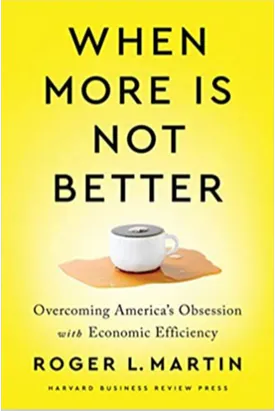When More Is Not Better: Overcoming America's Obsession with Economic Efficiency by Roger Martin
America has been obsessed with economic efficiency for centuries, but the idea of “more with less” has taken on a new intensity in the 21st century. In Roger Martin’s book “When More Is Not Better: Overcoming America’s Obsession with Economic Efficiency,” the author examines why this obsession has become so wide-spread and detrimental to our society.
Contrary to popular belief, economic efficiency is not just about conserving resources in order to maximize output. It is about cutting costs and maximizing profits, often at the expense of social responsibility. Martin argues that Americans are seduced by the lure of quantifiable results, which is why so many companies have embraced the idea of “efficiency at all costs.”
Unfortunately, this cost-cutting mentality has had a negative effect on the quality of life in America. Economic efficiency has driven down wages, increased income inequality, and put corporations in the grips of short-termism. It has also nurtured an unhealthy focus on short-term goals and outcomes.
So how can we move away from an obsession with economic efficiency? Martin suggests embracing a new concept known as “directed optimization,” which seeks to optimize for a variety of factors, rather than just economic benefit. Directed optimization does not value efficiency above all else; instead it seeks to take into account the needs of stakeholders such as employees and customers. This means that decisions should be based on factors such as customer satisfaction, quality of work, or employee engagement.
Given the complex nature of modern business, Martin suggests that we embrace an approach that recognizes the need for both economic efficiency and social responsibility. Companies should be focused on creating value, not just cutting costs. To do this, Martin recommends that corporations embrace a model he calls the “five networks of capabilities”. This model takes into account the interdependence of a company’s employees, customers, suppliers, financiers, and society. This helps organizations to better appreciate the potential of collaboration and interdependence.
Martin also warns us of the dangers of striving for efficiency without a social conscience. He argues that this myopic pursuit of economic efficiency can result in the destruction of communities, the erosion of worker protection, and the exploitation of vulnerable populations.
In the end, Martin paints a convincing portrait of an America dangerously obsessed with economic efficiency. The book is a must-read for anyone who wants to understand the dangers of our current economic climate and how to move forward in a way that values people, not just profits. “When More Is Not Better” is a timely reminder of how important it is for businesses to strike a balance between efficiency, social responsibility, and long-term value creation.

